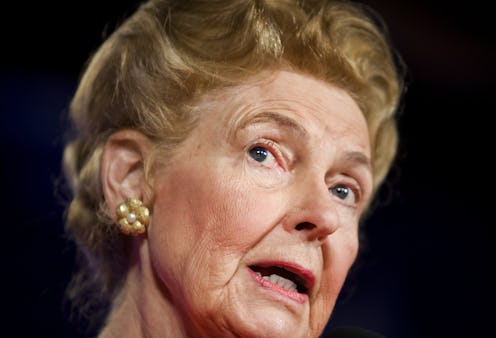The self-described "pro-family" conservative group Eagle Forum confirmed on Monday that its founder, Phyllis Schlafly, had died at her home near St. Louis. She was 92 years old. So, who was Schlafly, the conservative leader who made headlines earlier this year for her endorsement of Republican nominee Donald Trump? Her controversial legacy included campaigns against a number of things including modern feminism, abortion, communism, and the Equal Rights Amendment.
A St. Louis native, Schlafly spent decades spearheading a variety of conservative movements. She and her husband, a lawyer named Fred Schlafly, were devout Catholics, the Los Angeles Times reported. According to The New York Times, the couple believed that their Catholic and American identities were inextricably linked, and they consequently urged fellow Catholics to join them in their crusade against communism. She first became an influential conservative figure in the 1950s, the Times reported, precisely because of her anti-communist stance.
Then, in the 1960s, Schlafly published a popular book titled A Choice Not An Echo, which helped then-Arizona Sen. Barry Goldwater secure the 1964 Republican presidential nomination. But what Schlafly did in the 1970s became a central part of her controversial legacy. After the ERA passed the House of Representatives, Schlafly began a passionate campaign against it. Like many of the ERA's opponents, Schlafly believed the amendment posed a threat to laws that intended to "protect women" — like women's exemption from combat — and the Eagle Forum was born out of her Stop ERA campaign.
Though she was almost too late to stop it, Schlafly's campaign against the ERA is believed to have been an important contributor to the amendment's eventual defeat. By the time the 1982 deadline for the amendment's ratification rolled around, only 35 of the required 38 states had ratified it.
"Since the women are the ones who bear the babies and there's nothing we can do about that, our laws and customs then make it the financial obligation of the husband to provide the support," Schlafly told NPR's Michel Martin in 2014, to justify her opposition to the amendment. "It is his obligation and his sole obligation. And this is exactly and precisely what we will lose if the Equal Rights Amendment is passed."
It is for similar reasons that Schlafly often criticized modern feminism. In that same interview with Martin, Schlafly argued that she would not want to identify as a feminist because "the feminists don't believe in success for women."
A lot of people don't understand what feminism is. They think it is about advance and success for women, but it's not that at all. It is about power for the female left. And they have this, I think, ridiculous idea that American women are oppressed by the patriarchy and we need laws and government to solve our problems for us.
During her career, Schlafly was repeatedly on the receiving end of criticism from feminists like Betty Friedan, with whom Schlafly debated the ERA, and Gloria Steinem, who often slammed Schlafly's anti-abortion stance. Nevertheless, Schlafly pressed on, and her engagement in American politics spanned more than one generation. At the time of her death, radio station KMOX reported that Schlafly was still president of the Eagle Forum, despite reported infighting within the organization's leadership after its founder endorsed Trump.
Much of Schlafly's work was rooted in advocating for what she believed was pro-family and therefore pro-American. Her opposition to the ERA, much like her opposition to feminism, was the result of these pro-family views. She believed that feminism, and pieces of legislation like the ERA that worked to protect women's rights, were unnecessary and even threatening to the American way of life — an opinion that feminists strongly oppose, but one that helped her become an icon among some social conservatives.
